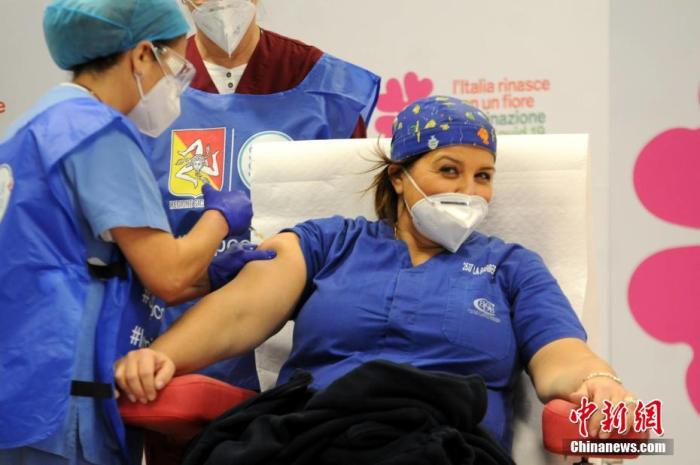Chinanews.com, May 27. According to a report from the Financial Times on the 27th, the European Union has requested the court to order AstraZeneca to pay damages of potentially up to billions of euros if the company fails to increase its damages by June at the latest. The delivery volume of the new crown vaccine.
According to the report, an EU lawyer told a Brussels court on the 26th that if the company fails to supply an additional 20 million doses of vaccine by the end of June, the European Commission requires the company to pay a daily fine of 10 euros for each dose of vaccine.
This request is part of a lawsuit initiated by the European Commission to force AstraZeneca to deliver 90 million doses of vaccine in the second quarter of this year, instead of the current planned 70 million doses.
Data map: Palermo, Italy, people are vaccinated orderly to prevent the new crown in the hospital.
Image source: ICphoto
"Financial Times" stated that this lawsuit marks an escalation of disputes between the EU and the company over the continuous delivery shortage of 300 million doses of vaccine contracts.
Rafael Jafrari, a lawyer for the European Union, said in a court in Brussels that the company “has not even tried to comply with its contract with the European Union”.
Initially, all parties expected that AstraZeneca would supply up to 300 million doses of vaccine to the EU in the first six months of this year, but due to production problems, this forecast was lowered to only 100 million doses.
The European Commission requested the court to order the company to increase its delivery to 120 million doses.
"The European Union does not accept AstraZeneca's delayed delivery of vaccines and believes that it violates the contract." The European Commission told the Financial Times.
"AstraZeneca must catch up with the agreed timetable as soon as possible."
The EU advocates that AstraZeneca should use 50 million doses of vaccine from other manufacturing plants to make up for the delivery shortage, and these manufacturing plants are designated as possible sources of production in the contract between the two parties.
Nearly 40 million doses of the vaccine were produced in the United Kingdom, and most of the rest were produced in the United States.
AstraZeneca insists that the production of the new crown vaccine is very complicated, and it has done its best to solve the huge challenge of expanding its production scale.
The company has always maintained that it has made the "best reasonable efforts" required by the contract to fulfill the EU's delivery schedule.
In an interview with the Financial Times last week, AstraZeneca’s Chief Executive Officer Suboco said that the production plants that supply vaccines to the EU are "bad luck"; other production plants-such as those in South Korea Production plant-no problems encountered.
What makes the EU particularly dissatisfied is that AstraZeneca has been more successful in fulfilling its British contract.
Subko said that the original contract signed between the British government and the University of Oxford-before AstraZeneca became a partner-included a provision for preferential access to vaccines produced in the UK manufacturing plant.
AstraZeneca argued that in its original bid on July 24, 2020, it told the EU that the UK production plant would only produce vaccines for the EU after completing the UK order.
AstraZeneca is still the EU's second largest supplier of new crown vaccines, second only to Pfizer.
Unlike many competitors, AstraZeneca has promised to provide vaccines on a non-profit basis during the epidemic.
For the EU’s accelerated vaccination work, the European Commission’s 20 million additional doses of vaccine sought from the company will have no impact.
Due to some rare but potentially fatal side effects, some countries have restricted the use of AstraZeneca vaccine.
Denmark has completely stopped this vaccine.
However, as the EU strives to achieve the goal of vaccinating 70% of the domestic adults (about 255 million people) by July, more AstraZeneca vaccines will enable it to have greater supply guarantees.
The European Union currently estimates that it will receive 519 million doses of various vaccines by the end of June, including 55 million doses of Johnson & Johnson's vaccine, which requires only one injection.
EU officials have proposed that additional AstraZeneca vaccines can come from overseas production facilities such as the United States that have not yet approved the use of the vaccine.
The Brussels court is expected to rule on the case in June.
The European Commission has also initiated another lawsuit against AstraZeneca for its alleged failure to perform the contract as a whole, requesting the court to order the company to pay damages.
The company defended this claim.

